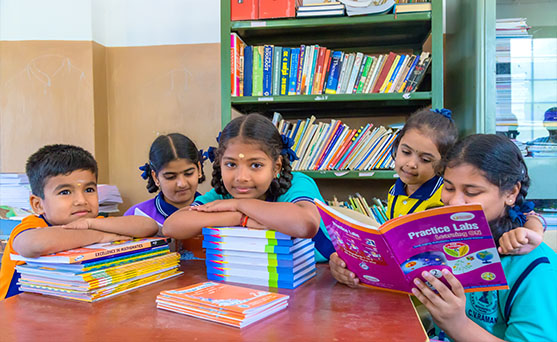Curriculum
The curriculum includes English, Tamil, Hindi, Maths, Science and General Knowledge as core subjects which prepare children for a smooth transition to a more formal Pre-Primary curriculum.
Communication Skills, Games, songs, creative projects, story-telling, role-playing, drawing and painting help develop children's foundational skills in literacy and numeracy. Singing, rhyming and reciting are employed in the Language Arts, and the Phonics Programme. The use of manipulatives, pictures and symbols helps them identify relationships between sets and groups of things to be sorted, counted, shared and represented. Picnics and field trips enhance students' understanding of their surroundings. Celebration of festivals sensitises them to multiple traditions and cultures.
Communication Skills, Games, songs, creative projects, story-telling, role-playing, drawing and painting help develop children's foundational skills in literacy and numeracy. Singing, rhyming and reciting are employed in the Language Arts, and the Phonics Programme. The use of manipulatives, pictures and symbols helps them identify relationships between sets and groups of things to be sorted, counted, shared and represented. Picnics and field trips enhance students' understanding of their surroundings. Celebration of festivals sensitises them to multiple traditions and cultures.
The main subjects include English, Tamil, Maths, Environmental Studies (EVS), Social Science, Computer Science, Hindi and General Knowledge. The curriculum also includes Physical Education. Field trips, excursions, co-curricular activities are integrated into the mainstream curriculum.
It offers an exciting and creative learning environment, with an inter-disciplinary appreciation of Languages, Mathematics, Science, Hindi, Computer science and Social science, as individual and integrated subjects. The curriculum also includes Physical Education, Co-curricular activities and General Knowledge. The focus on developing communication skills, reading, writing, listening, speaking, problem-solving skills helps them appreciate the value of education, as it reflects in their ability to express themselves, in addition to developing pragmatic skills.
Book, newspaper and magazine reading activities increase children's awareness of the world. Assemblies, concerts and drama productions help shape their confidence. Students' engagement in community service activities from Class III onwards sensitises them to the needs of their community and to the world around them; they visit old-age homes and orphanages to understand their situations and also to support underprivileged children.
The main aims of the Programme are developing skills related to writing, reading, reflecting, critical thinking, public speaking, fostering initiative among students and a desire to acquire knowledge. Academic subjects include English, Tamil, Hindi, Mathematics, Science (S1 and S2), and Social Science. Co-curricular activities, Physical Education and General Knowledge are integrated into the mainstream curriculum.
Role play, Projects, Seminars, presentations and group activities are more formal and research-based. Students begin to contribute to class assemblies, concerts and drama productions, and take up roles of responsibility. Community service is offered through School initiated programmes. NEET ,IIT-JEE MAIN,ADV,NATA,AGRI and several competitive exam training programs are also included as a part of curriculum for students.
Class VIII serves as a preparatory year for the Programme in Classes IX and X. Students study English, Tamil, Mathematics, Science (Physics, Chemistry and Biology) and Social Studies (History and Geography) as core subjects. NEET ,IIT-JEE MAIN,ADV,NATA,AGRI and several competitive exam training programs are also included as a part of curriculum for students.
Groups I: English, Tamil, Computer Science, Maths, Physics, Chemistry
Group II: English, Tamil, Maths,Biology, Physics, Chemistry
Group III: English, Tamil, Accountancy, Commerce, Economics, Computer Science
Groups IV: English, Tamil,
Accountancy, Commerce,
Economics, Business Mathematics
NEET and several competitive exam training programs are also included as a part of curriculum for students.
PUPA
(Prior Understanding of Pupil Attributes)
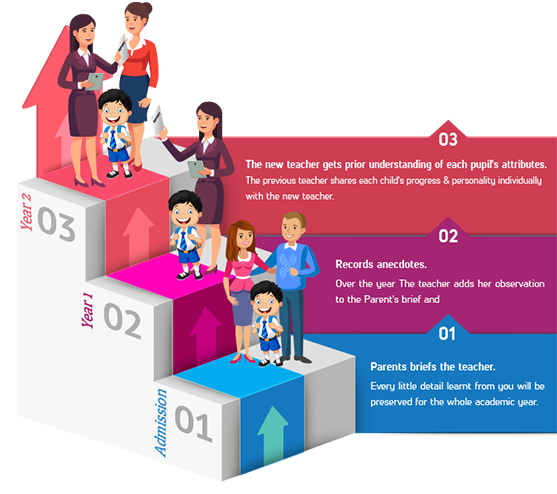
In conventional schools, by the time a teacher comes to know about the personality of the child, a lot of time has gone by. This also results in teachers “branding” children of specific behavior, which in reality might be ignorance in understanding the child.
P.U.P.A (Prior Understanding of Pupil Attributes) is an initiative of PRG School to enable the teacher to understand the children even before the academic year has started. PUPA is a collaborative effort which involves the parent as well as the teacher.
Instead of relying on brief notes of an admission form, our teachers spend time with each parent individually in an effort to know the child, his favourite TV programs, his fears, what makes him laugh, what word he uses for water or food. little things that will help the teacher handle the child in a way which is optimal to his learning. Every little detail learnt from you will be preserved for the whole academic year. Over the month the teacher will add her observations and record anecdotes that shape your child.
At the beginning of the next academic year, the previous class teacher sits with the new class teacher and shares each child’s progress and personality individually, helping her gain a prior understanding of each pupil’s attributes. And this process continues till the child is in school, ensuring that the teachers spend most of their time in the child’s learning & not in trying to understand the child.
Stem
(Science, Technology, Engineering, & Math)
Every organization, country and economy needs inventors and innovators. We owe the comfortable modern life that we live today to the efforts and inventiveness of these great people.
How does one become an inventor? Is there a textbook or a course called ‘Inventing 101’? No! The only way to become an inventor is to keep imagining, dreaming, trying, tinkering and inventing! As Thomas Edison said – “To invent, you need a good imagination and a pile of junk.”
We, at PRG School, in association with Hobby Master, give children a mindset and skill-set required to be inventive. It means sparking their curiosity, giving them material to work with, teaching them to use tools safely, showing them the connections between theory and the real world and mentoring them to be innovative.
As recognized world over, education, skills and careers in STEM (Science, Technology, Engineering and Math) fields are critical 21st century skills essential for success.
In our hands-on STEM sessions, children get an opportunity to work with real industrial grade material and tools and experience the sense of accomplishment in building a model that works.
Following are the highlights of the Hands-on STEM Education Program at PRG School
- Eight sessions for each grade
- Four working models will be built and taken home by each student.
- Hands-on experiments aligned to curriculum concepts.
- Content designed to make STEM sessions application-oriented, fun and engaging.
How do students benefit
- Greater curiosity and interest in STEM subjects.
- Improved motor skills.
- Understanding & appreciation of how things work.
- Develop ability to innovate.
- Sense of accomplishment and joy in building a model that works!.
PRGSEL
(Our people are our most important assets)
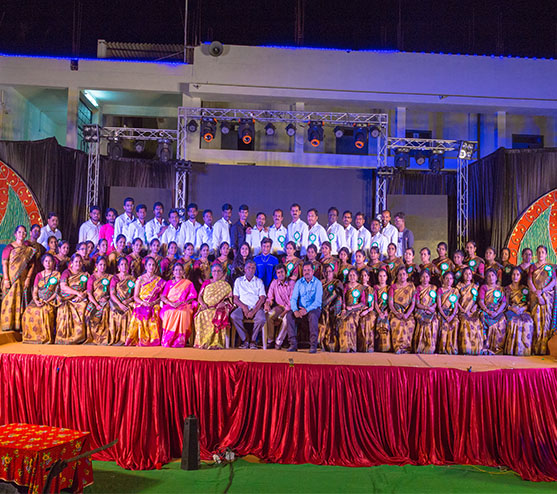
We, at PRG School, believe that our people are our most important assets. Effective teachers can have life changing impact on a student. Competent people in administration can make life so easy for teachers & parents as well. A Principal’s leadership can have a lasting impact on the image of the school.
At PRG, we consciously select only those people who are passionate about making a “real” difference to the learning process of the child. The best of the curriculum fails if there is no passion in delivering it & boring topics can become very interesting if the teacher just adds passion to it.
PRG School is arguably the only school in the country which has a sustained development program for its entire staff – PRGSEL. PRGSEL (PRG Institute of sustained education & learning) is a program designed to identify & fill gaps in each teacher’s development process. Through various observations, each teacher’s training & developmental needs are identified. Training programs are developed or outsourced according to those needs. Teachers go through the training programs & are evaluated again through additional classroom observations to ensure that they meet the benchmark of PRG School.
Transition Blocks
As teachers & parents, we have experienced the struggles that our children have to go through especially when the demands of the curriculum expand exponentially, for example when our child moves from Kindergarten to Grade I, from Grade IV to Grade V and from Grade VII to Grade VIII.
A kindergartner moving to Grade I has to cope with increased academics, structured formal class environment and increase in school timings. The added difference of separate teachers for different subjects creates sudden hurdles resulting in a sharp fall in motivation and consequently, learning.
Chrysalis High creates transition blocks. A specially designed block across which different stages of the curriculum from kindergarten to Grade X, where the teachers hold the children’s hands and help them leap across the hurdles seamlessly. Approaching changes are introduced gradually; skill gaps are met and closed. Curriculum is modified to help children prepare themselves to meet challenges of the next phase of their academic life.
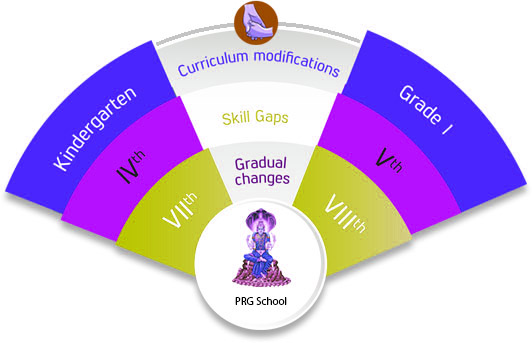
Community Integration
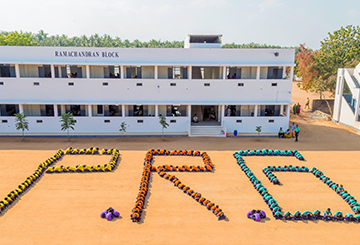
Community Integration Program, interwoven with the curriculum, is the thread of our core values of helping children gain self knowledge and moral responsibility towards the community. A grade wise progressive course of action, the Community Integration Program seeks to integrate learnt academic skills with application in practical life in and around the school.
The C.I.P is aimed at providing children with nuggets of experiences which propel them towards gaining an insight into their strengths and building their character through collaborative positive action throughout their academic life
Individual Support Program
Individual Support Program is one of the key differentiator of PRG School. While we truly believe in celebrating excellence, we also believe that at one point or another, every child needs support.
Classroom learning is a group effort and occurs in a dynamic, and more often than not, a distracting environment, therefore many children lose out on concepts, instructions and step during teaching.
Support, especially academic support, given at the right time, with the right intensity can help the child bridge that gap. These gaps, if not addressed at the right time can lead to low conceptual clarity, low motivation and ultimately a complete refusal towards academics tasks.
A thorough process of identification of skill gaps, target based program and strategy based remediation has helped many children recover their academic losses and integrate into the classroom with confidence and motivation.
